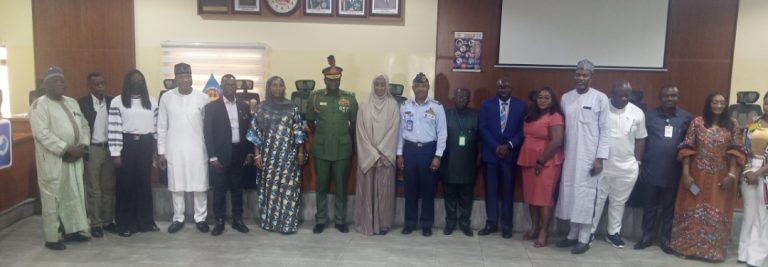Hajiya Sadiya Umar Farouq, the Minister of Humanitarian Affairs, Disaster Management and Social Development has called for collaboration with media and stakeholders to enhance effective communication and mandate delivery of the ministry.
Farouq made the call at the Communication, Consultative Forum with the media, partners and stakeholders on Tuesday in Abuja.
According to her, this is with a view to strengthening the communications activities of the Ministry and all humanitarian actors in Nigeria.
She explained that such collaboration would go a long way to ultimately enhance sharing of knowledge, expertise and wider publicity on the enormous works that the ministry was doing and delivering on its mandate.
“Humanitarian crisis, disasters and social issues are complex in nature, so also, communicating these complexities to multiple players and the public requires the adoption of a coherent, cohesive and coordinated approach.
“This approach requires communication solutions that provide information, advisories and guidance across a broad range of issues to all groups, partners, stakeholders, people of concern and publics within the mandate of the ministry, the agencies under its supervision and other stakeholders.
“This is why the Ministry continues to work assiduously to ensure our communications activities go beyond duty-bound approaches to more intentional and intrinsic connections with all stakeholders, partners and the public.
“While carrying out our mandate, we are aware of the important role of effective communications in ensuring that the tremendous work being done is properly communicated to the public.
“This is why we have put in a lot of effort to ensure that all programmes, activities and interventions of the Ministry are well communicated across print, electronic and online media,” she said.
She said discussions and ideas from the Forum were expected to form the foundation of information and experience sharing that would lead to the development of a Communication Strategy to serve as a guide for effective communication for the Ministry and all actors in the Humanitarian space in Nigeria.
“The Communication Strategy to be developed is not intended to duplicate or replace any Partner/Stakeholders existing communication, media or advocacy activities or tamper with their brand identity.
“Rather it will identify strategic ways that joint communications can help each achieve their vision and the community achieve their collective vision and goals.
“Ultimately, it will ensure excellent communications fueled by good intra-organisational and inter-organisational communication and connection,” Farouq said.
Also speaking, Mrs Halima Oyelade, the Special Assistant to the Minister on Strategic Communication while giving an overview of the Forum, said communication was very important because it influenced people on the choices they made.
According to her, lack of communication will create a big gap in the activities of organisations, adding that without communication, the public may not be aware of the activities of government.
Meanwhile, Dr Umar Bindir, the National Coordinator of, the National Social Investment Programme (NSIP), said the purpose of the programme was to lift 100 million Nigerians out of poverty.
According to him, NSIP is doing a lot and there is a need to communicate the remarkable achievements of the programme via effective communication.
Also, Maj.-Gen. Ibrahim Maun Yusuf, the Commandant, Nigerian Defence Academy, in his presentation ‘Counter Insurgency Operation; Strategic Communication versus the Rules of Engagement, said there were Kinetic and non-kinetics approaches to the war against insurgency.
Yusuf said criticism against the military in the war against insurgency demoralized the gallant troupes on the battlefield, adding that giving the insurgents and bandits more publicity was not helping the country.
He called for patriotism from the media and other stakeholders to boost the morale of the Nigerian military in the war against insurgency, kidnapping and banditry in the country.








